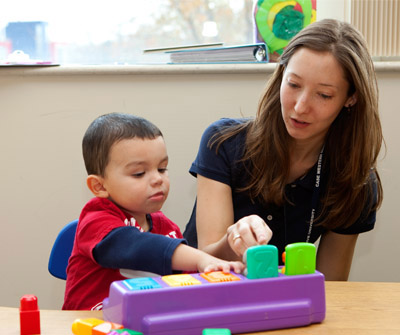Let's face it, sometimes we give it our all and just don't see the results we desire. When you or your child has been working forever on a sound like "r" or "s" and the progress isn't happening, the results can be disappointing. I get it-- having one little speech sound error hang around comes with a whole host of problems. Whether it is jokes at your expense, anxiety meeting new people, or even bullying, you would do anything to make a change.
Opti-Speech: A Game-Changer in Speech Therapy
Tags: Speech, Communication, Teens, Voice, talking
Communication Skills for Children with Angelman Syndrome
Angelman syndrome is a rare neurogenetic disorder that occurs in about 1 out of every 15,000 people. Most people with Angelman have very limited speech, or no speech at all. If you’re the parent of a young child with Angelman, you may be wondering how you can help your child learn to communicate, since speech is not going to be their main way of communicating. Here are a few suggestions to get you started:
Tags: Speech, Language, Communication, Voice, toddler, talking
5 Things to Expect During a Speech Evaluation
If you are having difficulty understanding your child, you might want to consider a speech-language evaluation. An evaluation is a normal step to pursue when parents or caregivers suspect difficulty with communication.
Ask your pediatrician for a referral to a speech-language pathologist (SLP) - a professional who diagnoses speech and language difficulties. An evaluation will include the following:
Tags: Speech, Communication, Voice, toddler, talking
My Child Isn't Talking Yet - What Now?
Early in infancy, you will see signs that indicate that your child is hearing, listening, and understanding what is going on around him/her. Your child is learning language long before he/she produces that first word.
There is a typical progression to language development. Initially, your child will turn to find sounds, follow with his/her eyes when something moves in their view, look at what you are looking at (joint attention). All of these skills are part of language development. Later, your child will respond by pointing or may get your attention by touching you or vocalizing.
Tags: Speech, Language, Communication, Voice, toddler, talking
What is Aphasia?
Aphasia is a language disorder resulting from an injury to the brain, such as a stroke or head trauma. Aphasia involves varying degrees of communication difficulties in these areas:
Spoken Language Comprehension - otherwise known as “Receptive Language” or “Auditory Comprehension.”
Symptoms may include:
Tags: Speech, Language, Communication, Support, Stroke, Brain Injury, talking
6 Ways to Use Your Eyes to Help You to Hear
Everyone uses their vision to support their hearing. For example, if we see lightning, we know there will be thunder, or if we see something fall, we know it will make a sound. Even without sound, we can watch a football game and often “see” what an unhappy coach is saying to a player who fumbled the ball.
Tags: Communication, Hearing, Hearing Loss, "ears"
5 Tips to Avoid a Tantrum
There aren’t any magic tricks that we can use to prevent all tantrums, but there are some tips to help avoid some of the outbursts that may be happening more regularly.
First, make sure that your child is getting enough sleep, has a healthy diet, and has lots of time to run and play every day. Look at the big picture, and from there start to identify if there are triggers that will set-off a tantrum.
Tags: Speech, Language, Communication, Voice, toddler, talking, tantrum
5 Toys = 5 Ways to Improve Speech Development
Playing with your child is a essential way to improve his/her speech, language, and social skills! Below are five different toys and ways to play with your child to encourage language growth and development:
Mr./Mrs. Potato Head:
- Following Directions: Ask your child to give you various parts. If this is too simple, ask him/her in a more complex way. For example, instead of asking for Mr./Mrs. Potato Head's shoes, say "the ones you put on your feet.” Sometimes this works best after the child has built Mr./Mrs. Potato Head and is asked to follow the directions of placing each part back into the box.
Tags: Speech, Language, Communication, Support, Learning, Voice, toddler, talking
May is Better Hearing & Speech Month
Did you know…
- An estimated 40 million Americans experience speech, language, and/or hearing disorders.
- The second most common reason for special education services in public schools is speech/language impairment.
- 36 million American adults report so
Tags: Speech, Hearing Aid, Audiology, Language, Hearing Aids, Communication, Hearing, reading, literacy, Hearing Loss Prevention, Teens, Support, Caregiving, Hearing Loss, Stuttering, Learning, Voice, toddler, talking, Autism
Baby Sign Language for Improved Communication
Teaching your infant Baby Sign Language can help improve his or her communication skills. This is particularly appealing for new parents, given that there’s a gap between what babies and toddlers want to say and what they can verbally express.
Tags: Speech, Language, Communication, American Sign Language, ASL, Learning, Voice, toddler, talking



















